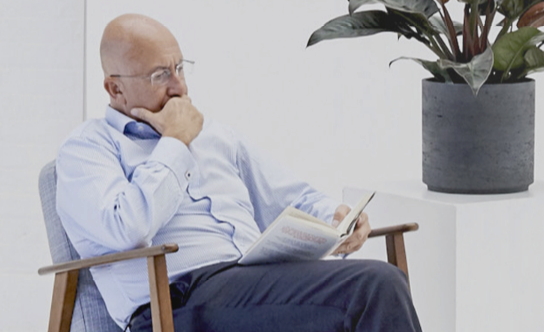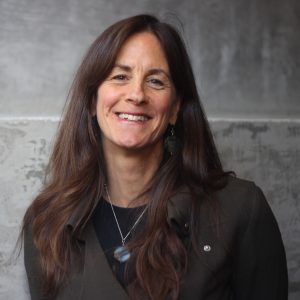As a lead up to Sustainable Brands conference SB’18 , students, alumni, and faculty of our MA in Sustainable Design program interviewed selected speakers — leaders in corporate sustainability initiatives. In this blog we share our interview with David Grayson, Professor Emeritus, Cranfield School of Management, University of Cambridge.
David Grayson is working to inspire the best in business, people and society. He is an advocate for Responsible Business, Sustainability, cross-sector collaboration.
What did you talk about at SB’18?
I joined Chris Coulter from GlobeScan and Mark Lee from SustainAbility, to talk about our new book All In: the Future of Business Leadership.
The book looks at 20 years of annual sustainability leaders surveys. In particular, we looked at the question: Who do people think are the leading companies in sustainability? This has shifted considerably since 1997. Then we asked the people who were leading these companies at that time what were they were hoping to achieve? What were their experiences? We also asked next-generation entrepreneurs in China and Africa what they think it will take to be a real global leaders in sustainability. We have a time horizon out to 2030 (which marks the end of the SDGs). The book is about what is required of companies, from global to small.
What is the most exciting thing you’re working on?
The book, of course! We did all the interviews between July and December, and the writing over December/January!
The other is actually my volunteer work as Chair of a British charity Carers UK. This organization has been going for over 50 years and I’ve been chair for four. We seek greater support for people who are caring for friends and family, unpaid. There are 6.5 million of these caregivers in the UK and of course many more worldwide. I’m excited about how we are raising awareness in the UK and around the world of the vital role of caregiving by family and friends
What was your personal path to sustainability?
My path has been very much on the social and economic pillars, not so much the environmental. In my early 20s, I created a social enterprise (though that term did not exist at that time) called Project North East (now called PNE Group) in the north-east of England. We developed a series of new ideas around job and enterprise creation and tried them out. In the 40 years since, we’ve done work in nearly 60 countries around the world. PNE was created from nothing, no benefactors. We were amongst the early pioneers of public-private community partnerships.
Later I moved to London to help establish a youth enterprise fund for HRH The Prince of Wales and then moved to Business in the Community which is one of the oldest corporate responsibility organizations in the world.
If you could travel back in time what would you tell your 20-year-old self?
I got involved in campaigning as a young teenager. From an early age, I was interested in changing the world around me. I very nearly died when I was eleven from a bone disease. When you have survived such a near-death experience, you feel you have to justify your presence here. From then on, that always was the most important driving force.
What I would tell my 20-year-old-self (and my 35-year-old self!): Don’t get stressed out. Don’t take it so seriously, because this is for the long haul. Be a bit kinder to yourself, in terms of pacing. You don’t have to work so many hours, beating yourself up about what hasn’t been done yet. All of us in the sustainability world know that there are so many things that need to be tackled.
I’m better this now. I recently got an email from someone who worked for Business in the Community in the 1990s. She used to call me “my rambutan”, which I learned was a fruit with a hard prickly outside and nice and sweet inside. I used to be a real workaholic. We were creating a whole new field and it felt like a very heavy weight. I was lucky because I haven’t burned out, though many of us probably know colleagues who have. It’s understandable because we feel the urgency.
One of the great merits of the SDGs is that the global community recognizes that they are all interconnected — all of the 3 pillars and the 17 SDGs. Don’t lose sight of that.
What has been your proudest moment in sustainability?
I still get enormous satisfaction, even though I’ve not been involved for 30 years, in the fact that the social enterprise I co-created, PNE is still going strong after 40 years and continuing to innovate. The fact that I had that early experience made me credible in helping to galvanize and become a national spokesperson in the late 1980s for the UK local enterprise movement, to raise standards, build them up. At a time when UK was going through massive economic transformation (the Margaret Thatcher era), we were an important movement for new ways for social and economic regeneration. We gave hope during a very difficult time.
Also my very first book, in 2001. I thought about it for 10 years before a friend suggested that we write a book together. In the end, the Prince of Wales wrote the forward and we partnered with The Financial Times. The title was Everybody’s Business: Managing Risks and Opportunities in Today’s Global Society. I am proud that we were early in the corporate responsibility world to recognize that this is not just about risk mitigation — it’s about business opportunity. It’s a very accessible, very visual book, with color photos on every page. We didn’t use CSR language. That framing as opportunity is still relevant 20 years on.
And now, of course, I am immensely proud to have been able to work with two global experts Chris Coulter and Mark Lee to produce our new book “All In.”
If you had a magic wand and could completely solve one sustainability problem, what would it be?
I would be particularly interested in tackling the whole idea of intergenerational equity, and how we can try to create a better understanding and “social contract” between the generations.
We interviewed Paul Polman, the CEO of Unilever, for All In and he thinks of sustainability as The Golden Rule (do unto others…), but on an intergenerational basis. If we could get a greater sense of intergenerational equity and understanding, that would go a long way towards eliminating the sense of “other”, of difference, that we’re suffering too much from, around the world. Too often people focus on what is different and reduce everyone down to a single identity with a label, whereas what we need to try to do is to see the multiple identities that we all have. To find what we have in common with someone else, rather than what divides us. For example, as different as we may be, you and I both might love jazz or podcasts or tennis. If we take the time we can find the multitude of “sames” rather than focus on differences.
Thank you, David!
~Denise
[image courtesy of https://davidgrayson.net/ ]
If you would like to go all in and become a future leader of sustainable design, explore our MA in Sustainable Design program!

